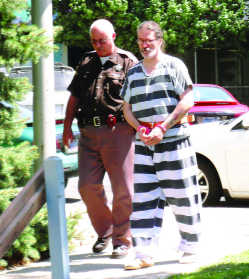Minnick case could finally be closed with appeals court ruling

Never say never, wise men often advise, but the 30-year courtroom saga of convicted Greencastle murderer William A. Minnick may finally have come to an end.
The Indiana Court of Appeals Tuesday affirmed much of the 160-year sentence Minnick received last August in an emotional resentencing hearing in Lawrence Circuit Court at Bedford, effectively reducing it to a total of 130 years.
Minnick had appealed that Aug. 23, 2011 sentence imposed by Lawrence Circuit Court Judge Andrea McCord following his convictions for Murder 1, Class A felony robbery and Class A felony rape in the same courtroom in September 1985.
Twice-convicted for the Oct. 26, 1981 murder of 24-year-old housewife Martha Rushing Payne in her own home at 9 S. Locust St., Greencastle, home, Minnick had contended the trial court erred in imposing sentences for his robbery and rape convictions.
Represented by Indianapolis attorney Brent Westerfield, Minnick argued that his convictions for Class A felony robbery and murder represent double jeopardy, and that the trial court abused its discretion in refusing to order an additional competency evaluation before sentencing him.
The appeals court, however, did not see it that way.
"We affirm in part and reverse and remand in part with instructions," the Indiana Court of Appeals announced in an opinion written by Judge Cale J. Bradford and concurred with by Judges Nancy H. Vaidik and Terry A. Crone.
Putnam County Prosecutor Tim Bookwalter, who inherited the longstanding local murder case in time for last summer's resentencing drama, expressed relief Tuesday afternoon.
"The appeals court came down squarely on our side," he told the Banner Graphic.
Bookwalter agreed that with Death Row sentencing implications off the table, the likelihood of further appeals appears slim.
"Hopefully this is the final chapter," Bookwalter said. "He can always ask for the case to be transferred to the Indiana Supreme Court or federal court but I doubt it. There's no merit for it."
Especially important to the state's case was that the appeals court judges sided with Judge McCord's ruling on Minnick's competency to aid in his own defense at the August 2011 hearing.
"I've been observing Mr. Minnick during this proceeding," Judge McCord said prior to her resentencing order. "He's sat calmly, he has aided counsel, asked questions, I believe that his allocution statement was very clear and concise. He made points to the court that I believe were appropriate.
"I have no reason to believe," she continued, "he wasn't competent to aid counsel in this hearing, so any concerns had or requests raised regarding that I am going to deny. I think that he was competent for this hearing and appropriately aided counsel in his defense."
Specifically addressing the competency issue, the appeals court judges agreed the trial court "decided to proceed while making it clear the issue could be raised again at any time. As it happened, the hearing proceeded to completion without any indication that Minnick was incompetent."
"When the trial court observed that Minnick was aiding counsel during the hearing and noted that his allocution was very clear and concise, his counsel did not contradict these statements or point to any indication that he was incompetent during the hearing," the appeals court opinion continued. "Indeed, Minnick does not challenge the trial court's observations on appeal or even claim that he was actually incompetent during the hearing. At no point during the hearing was the trial court faced with any bona fide evidence that Minnick was incompetent, and consequently it did not abuse its discretion in failing to order another competency evaluation."
That was crucial, Bookwalter said.
"The big issue all along was competency," the prosecutor suggested. "The court came down squarely on our side, and I think that puts the competency issue to bed forever. They've taken away that argument whatsoever.
"Overall, they cut it (the sentence) back, but they took away any potential appeal on down the road."
The one place the appeals court did rule in Minnick's favor was in agreeing that the fatal stab wound to Martha Payne's back could not be used as an agrravator in both the murder charge and the robbery charge. Minnick's robbery conviction had been for a Class A felony since it resulted in serious bodily injury.
However, allowing the stabbing to stand just as an element of the murder charge only resulted in the reduction of Minnick's robbery conviction to a Class B felony. That reduced charge carries a maximum sentence of 20 years -- 30 years fewer than assessed by Judge McCord in August at Bedford.
That means instead of Minnick being ordered to serve 60 years for murder, 50 years for rape and 50 years for robbery, a total of 160 years all to run consecutively (not concurrently as the defense had hoped), he is instead ordered to serve a total of 130 years (60 for murder, 50 for rape and 20 for robbery).
In its conclusion in the opinion issued Tuesday, the appeals court stated: "We conclude that the trial court properly imposed sentences for Minnick's robbery and rape convictions. We further conclude that the trial court did not err in failing to order another competency evaluation for Minnick.
"Minnick's conviction for Class A felony robbery, however, violates prohibitions against double jeopardy. We reverse in part and remand with instructions for the trial court to reduce Minnick's robbery conviction to a Class B felony and impose a 20-year sentence to run consecutively with his 60-year sentence for murder and his 50-year sentence for Class A felony rape, for a sum total sentence of 130 years executed."
No further resentencing hearing will be necessary to impose that revised sentence, Bookwalter said.
Overall, the county prosecutor was content with the appeals court ruling.
"In real time, 130 years versus 160 years doesn't make much difference," he said, indicating Minnick will likely end up dying in prison either way.
